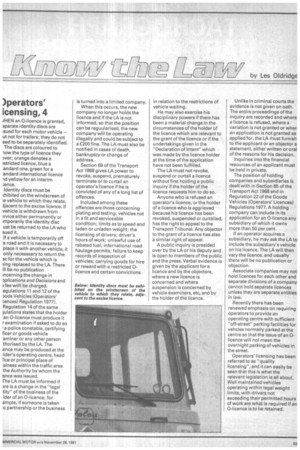\ ° AY by Les OldridgE
Page 35

If you've noticed an error in this article please click here to report it so we can fix it.
)perators icensing, 4
MEN an 0-licence is granted, aparate identity discs are ;sued for each motor vehicle — ut not for trailers; they do not eed to be separately identified. The discs are coloured to -low the type of licence they Dyer; orange denotes a )stricted licence, blue a :andard one, green for a .andard international licence ld yellow for an interim
ence.
Identity discs must be
(hibited on the windscreen of le vehicle to which they relate, ljacent to the excise licence. If vehicle is withdrawn from )rvice either permanently or ,mporarily the identity disc ust be returned to the LA who sued it.
If a vehicle is temporarily off e road and it is necessary to place it with another vehicle, it only necesssary to return the sc for the vehicle which is )ing replaced to the LA. There ill be no publication
incerning the change in plications and Decisions and ) fee willl be charged. egulations 11 and 12 of the Dods Vehicles (Operators' 3ences) Regulation 1977). Regulation 14 of the same lulations states that the holder an 0-licence must produce it r examination if asked to do so a police constable, certifying ficer or goods vehicle aminer or any other person thorised by the LA. The ence may be produced at the ,Ider's operating centre, head rice or principal place of siness within the traffic area the Authority by whom the ence was issued.
The LA must be informed if ..re is a change in the "legal tity" of the business of the lder of an 0-licence; for ample, if someone is taken o partnership or the business is turned into a limited company.
When this occurs, the new company no longer holds the licence and if the LA is not informed, so that the position can be reguularised, the new company will be operating illegally and could be subject to a £200 fine. The LA must also be notified in cases of death, bankruptcy or change of address.
Section 69 of the Transport Act 1968 gives LA power to revoke, suspend, prematurely terminate or to curtail an operator's licence if he is convicted of any of a long list of offences, Included among these offences are those concerning plating and testing; vehicles not in a fit and serviceable condition; limits as to speed and laden or unladen weight; the licensing of drivers; driver's hours of work; unlawful use of rebated fuel; international road haulage permits; failure to keep records of inspection of vehicles; carrying goods for hire or reward with a restricted 0licence and certain convictions in relation to the restrictions of vehicle waiting.
He may also exercise his disciplinary powers if there has been a material change in the circumstances of the holder of the licence which are relevant to the grant of the licence or if the undertakings given in the "Declaration of Intent" which was made by the licence holder at the time of the application have not been fulfilled.
The LA must not revoke, suspend or curtail a licence without first holding a public inquiry if the holder of the licence requests him to do so.
Anyone who is refused an operator's licence, or the holder of a licence who is aggrieved because his licence has been revoked, suspended or curtailed, has the right to appeal to the Transport Tribunal. Any objector to the grant of a licence has also a similar right of appeal.
A public inquiry is presided over by the LA or his deputy and is open to members of the public and the press. Verbal evidence is given by the applicant for a licence and by the objectors, where a new licence is concerned and where suspension is concerned by vehicle examiners, etc, and by the holder of the licence.
Unlike in criminal courts the evidence is not given on oath. The entire proceedings of the inquiry are recorded and where a licence is refused, where a variation is not granted or wher, an application is not granted as applied for, the LA must furnish to the applicant or an objector a statement, either written or oral of the reasons for his decision.
Inquiries into the financial resources of an applicant must be held in private.
The position of holding companies and subsidiaries is dealt with in Section 85 of the Transport Act 1968 and in Regulation 22 of the Goods Vehicles (Operators' Licences) Regulations 1977. A holding company can include in its application for an 0-licence any subsidiary of which it owns more than 50 per cent.
If an operator acquires a subsidiary, he may ask the LA to include the subsidiary's vehicle on his licence. The LA will then vary the licence, and usually there will be no publication or objection.
Associate companies may not hold licences for each other and separate divisions of a company cannot hold separate licences unless they are separate entities in law.
Recently there has been renewed emphasis on requiring operators to provide an operating centre with sufficient "off-street" parking facilities for vehcles normally parked at the centre so that the issue of an 0licence will not mean the overnight parking of vehicles in the street.
Operators' licensing has been referred to as "quality licensing", and it can easily be seen that this is what the relevant legislation is all about. Well maintained vehicles operating within legal weight limits, with drivers not exceeding their permitted hours of work are what is required if an 0-licence is to be retained.








































